DeKalb Leads The Way On Early Learning In Georgia
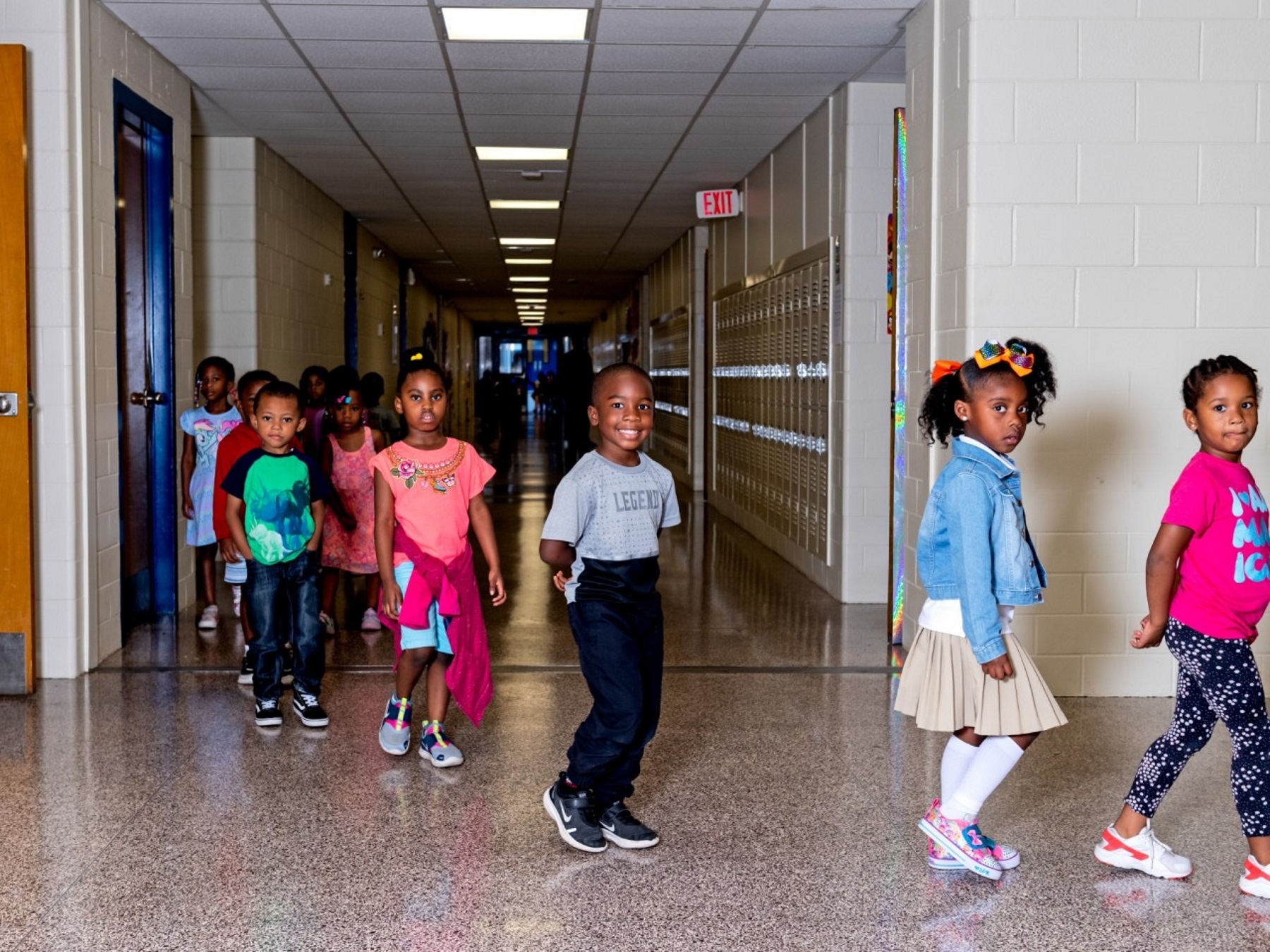
The DeKalb County School District opened the Early Learning Center during the 2018-19 school year. It serves 300 3- and 4-year-olds. (Johnathon Kelso/For WABE)
Nationally, the majority of kids who enter kindergarten aren’t ready.
The DeKalb County School District wants to change that. So, it’s doing something rare. It’s offering school to children as young as 3 years old.
The Setup
The DeKalb Early Learning Center, or ELC, is in the old Terry Mill Elementary School near Fayetteville and Terry Mill roads in unincorporated DeKalb. It’s the only public school in the state that teaches 3- and 4-year-olds. It opened for the 2018-19 school year with its first class of 3-year-olds. This year, it added 4-year-old pre-kindergarten.

The center has 11 classes of 3-year-olds this year. They have a teacher/student ratio of 1:15. There are eight 4-year-old classes, with a ratio of 1:22. Six of those classes are funded by Georgia’s universal pre-K program.
Applications are open to any 3- and 4-year-olds who live in the county limits.
However, the ELC can’t take everyone.
It currently enrolls 300 students. Dr. Zack Phillips, the center’s acting director, says there are about 200 kids on the waiting list.
A school tour reveals children working busily in centers. They’re practicing letter sounds, learning to count and listening to stories. Phillips says teachers use age-appropriate curricula.
“We run the program like a traditional school,” he said.
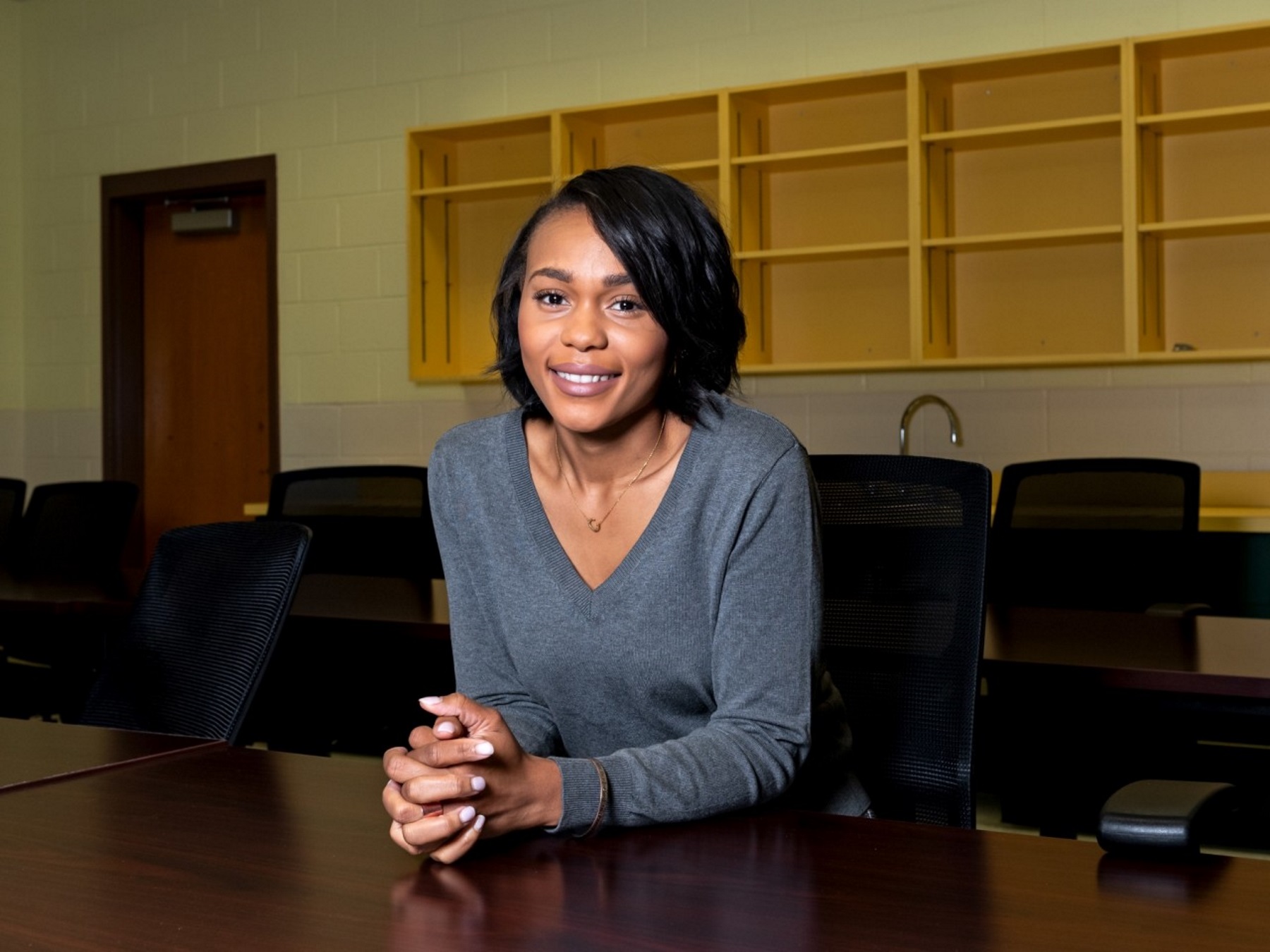
That may sound stringent, but Phillips says 3-year-olds are ready to learn.
For students who fall behind a little, the teachers use what’s called “double dosing” at naptime. Teachers work with kids for 10-15 minutes on skills they need extra help to master.
Teachers can also give kids who are ahead a “double dose” of an advanced skill.
Monica DeBowles says that’s what teachers do for her 3-year-old son Christian. She says he knows his vowel sounds, so teachers work on sight words with him.
“His teacher does let me know that she’ll try certain things, and he will keep moving forward,” DeBowles said. “Even if he doesn’t grasp it 100%, she’s at least exposing him to it, and that’s what I really love.”
School, Not Day Care
Other parents agree the center is like school, not a free babysitting service. Candace Bell says that should make her 3-year-old daughter’s transition to kindergarten easier.
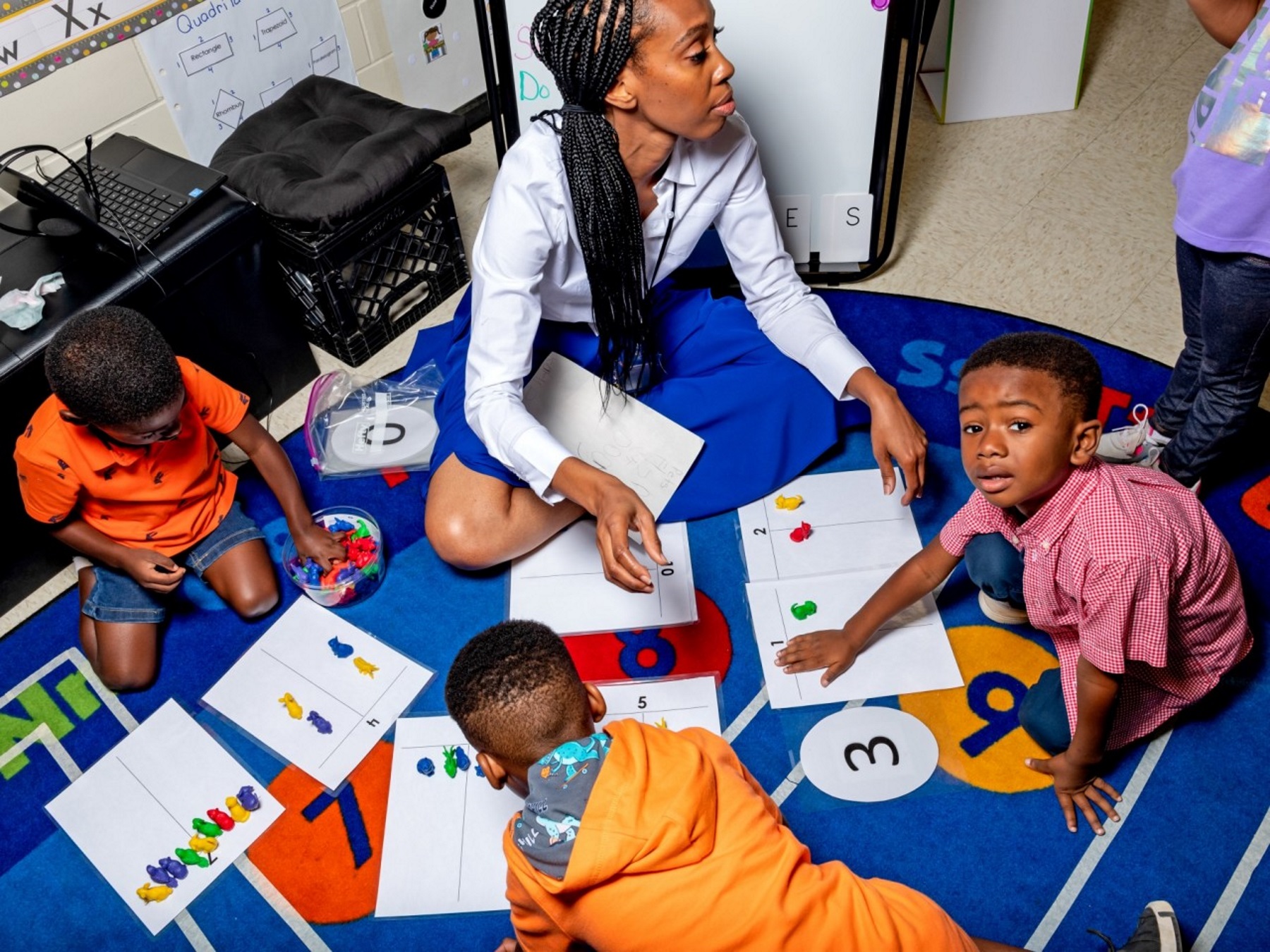
“It gave them the independence to walk into a school building, where there are children like them, and they also have administrators walking around,” Bell said. “It’s just not this day care with babies in the background and they don’t feel like the older children. It’s a place for them.”
The ELC has a STEAM (science, technology, engineering, arts and math) focus. Bell says she can tell her daughter is absorbing what she’s learned in that program.
“We were outside one day and she said, ‘Yes, Mommy, we can’t kill the bug because that’s its habitat,’” Bell said. “’We have to keep him in his habitat.’”
I feel like every region, every district needs to have an ELC. We’re building the foundation. Not only with our kids, with the family. This should be everywhere.”
Kiwana Norman, pre-K 4 lead teacher
Muhammad Walker has also been impressed with the instruction at the ELC. His son, also named Muhammad, has surprised him with his grasp of shapes.
“We’re driving down the road [and he says], ‘Daddy, that’s a rhombus,’” Walker said. “’I learned that in school.’ The stop sign … he doesn’t just say it’s a stop sign. He tells me the shape. He says, ‘That’s an octagon, Daddy.’”
Two years ago, Walker’s son went to a private day care center in Stone Mountain.
“It was a good day care,” he said. “But they didn’t have a curriculum like they [have] here for a 3-year-old. I feel a whole lot more comfortable with him being here.”
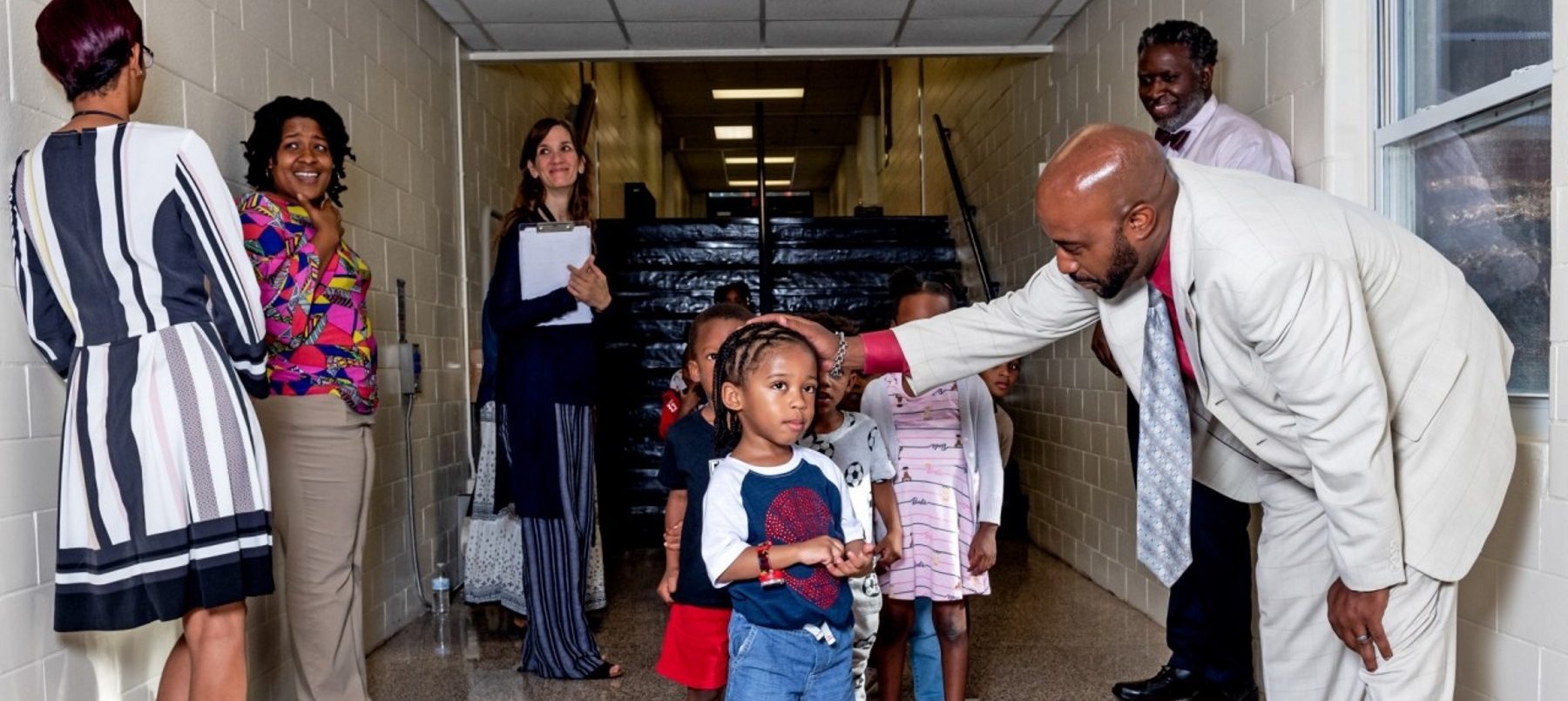
There are signs of learning around the center as well.
In the hallway, Phillips stops to talk with 4-year-old Gabriel Parks. Gabriel shares that his favorite dinosaur is the T-Rex, even though he’s not perfect.
“One weakness of the T-Rex is his tiny arms, but the tiny arms did have something that’s useful because they were useful for holding onto prey,” he said.
Phillips asked him what prey is.
“You know, it’s food,” Gabriel said.
What’s The Big Deal?
So, why the intense focus on kindergarten readiness?
“Once the kids get to kindergarten, sometimes they’re not quite prepared,” said Rodney Mallory, the ELC’s vice principal. “So, there’s a gap in the test scores. So, we’re getting kids ready right now through the curriculum. I think birth to 5 is when you learn more information than at any other point in your life.”
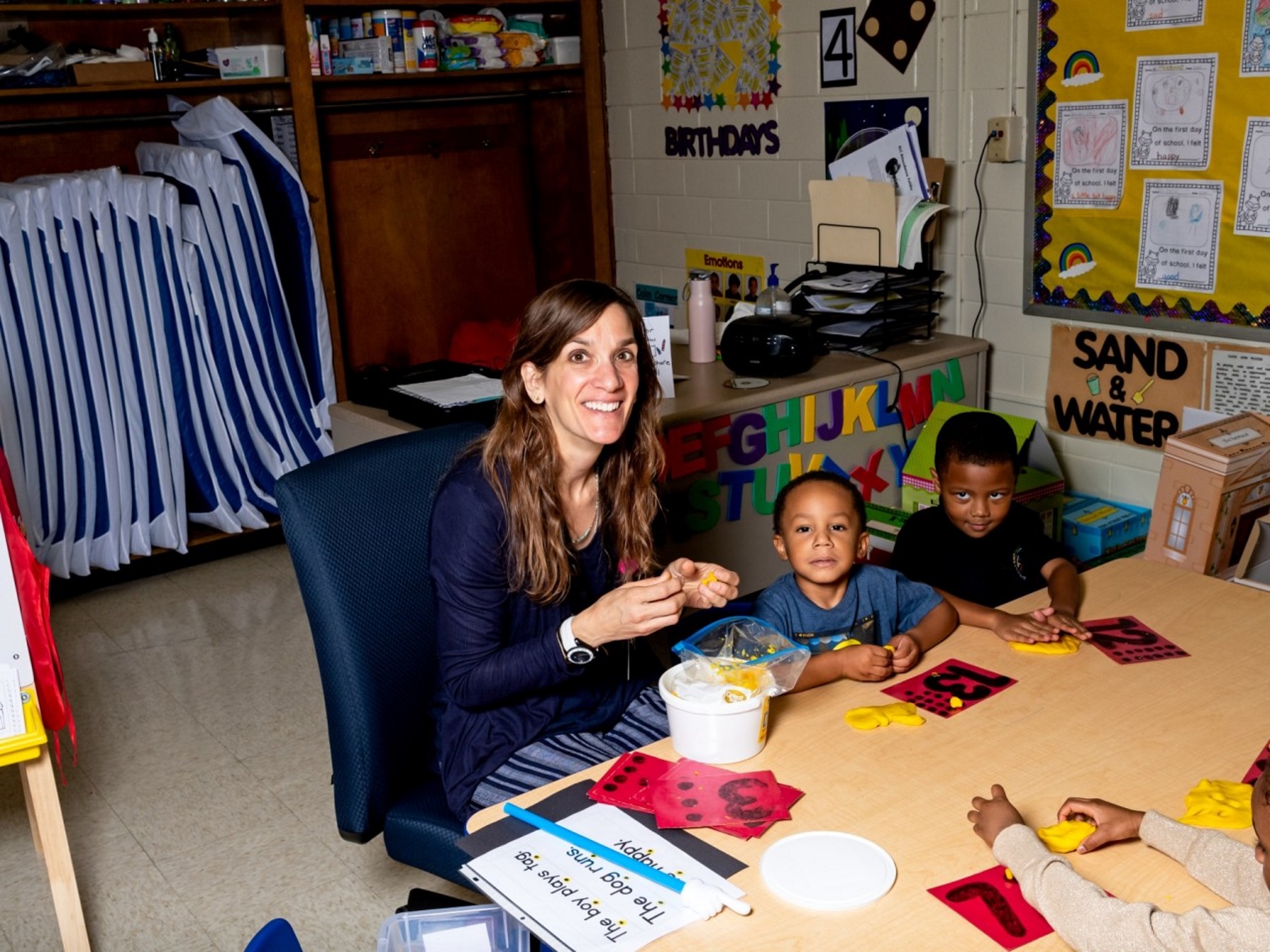
Research shows if kids who are behind don’t get extra help, the gap grows.
Zack Phillips has hired several teachers with early education experience, so they know what kids need to master before kindergarten.
In Julia Scott’s pre-K classroom, children are kneading Play-Doh to strengthen their hands. They roll it into tiny balls and use it to help them count.
“When I taught kindergarten, I had students who came in who had never held a pencil before,” Scott said. “So, to get them used to holding crayons and pencils and everything is invaluable really to have them get a head start.
Another reason why many schools have focused on preparing kids for kindergarten is to make sure they don’t fall far behind by the third grade.
ELC Features:
*There is a tuition-based after-school program.
*Teachers are certified and paid on the DeKalb teacher salary scale.
*The center has community-based services like food pantries and counseling for families.
*Parents need to provide transportation.
*Anyone (with a 3- or 4-year-old) living in the school district can apply.
*Some classes are “looped,” meaning teachers keep the same class both years.
Experts have identified third grade as the year kids need to be reading on grade level so they can keep up as the work gets harder. It’s often phrased as switching from “learning to read” to “reading to learn.”
According to state data, about 64% of DeKalb third graders were reading on grade level during the 2018-19 school year. The state average was 73%.
Phillips wants to make sure the ELC’s efforts have a lasting effect on students. So, through a partnership with Georgia State and Florida State universities, the center will track students’ progress through the “Three to Three” initiative.
“We will be monitoring our babies from age 3 until they get to grade three … in hopes that the research will support what we’re doing here,” Phillips said.
‘It’s Like A Family’
Phillips says he’s received calls from other districts — in and outside Georgia — interested in replicating this public preschool model.
But teachers and parents here seem to imply there’s one aspect of the school that may be hard to duplicate: the climate. Parents feel welcome. Teachers feel supported.
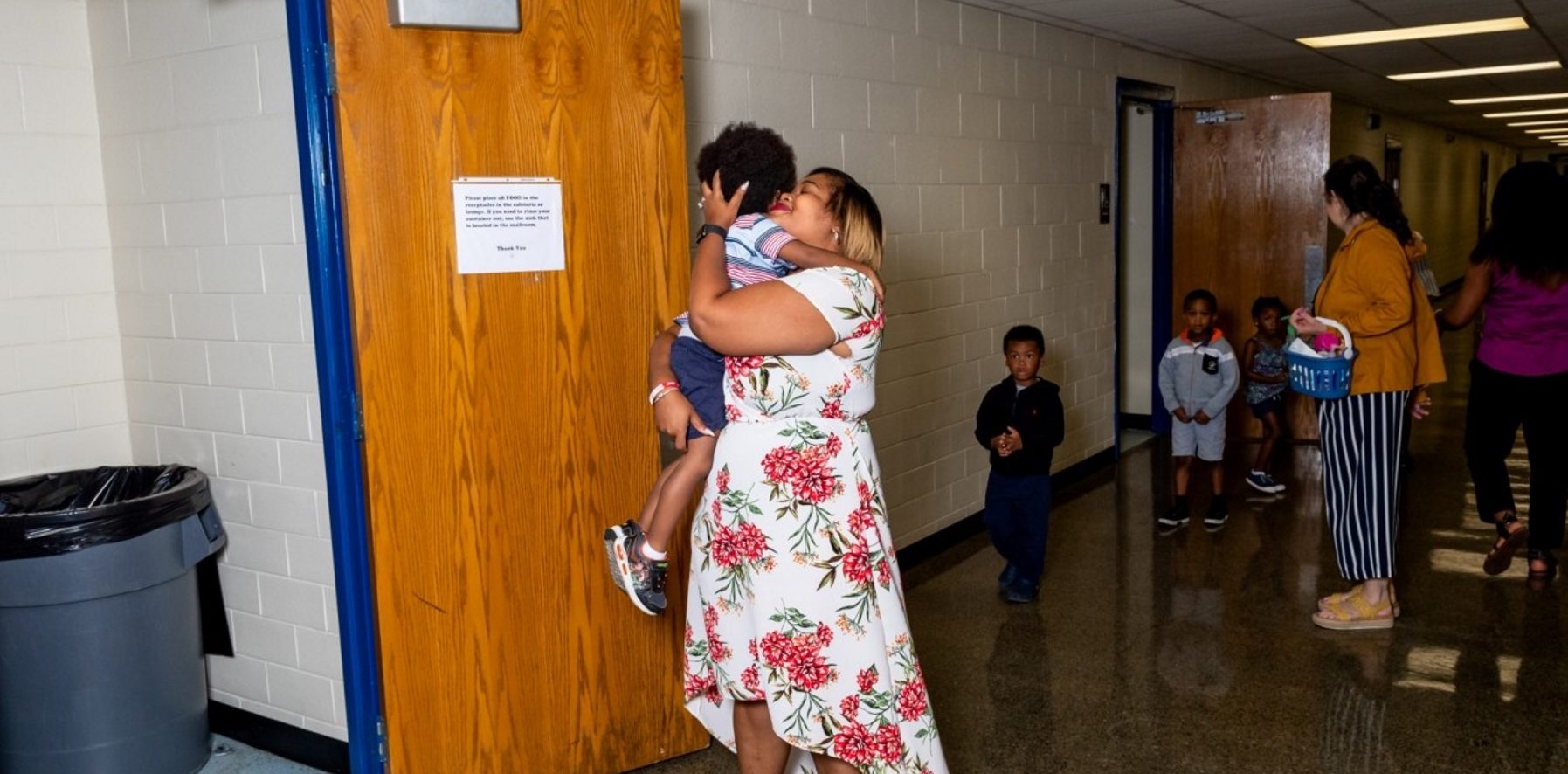
One afternoon, Monica DeBowles was running late to pick her son up from the after-school program. She walked into the school building and saw him playing in the front office. She immediately assumed he was in trouble until the school receptionist assured her otherwise.
“I love that [she was] just willing to spend extra time with my son or you love him enough to have him up here playing with you and there’s nothing wrong,” she said.
Teachers credit Zack Phillips with creating a family atmosphere at the ELC. Teachers constantly communicate with parents about students’ progress, even posting their behavior and accomplishments online.
“It’s not just like, ‘OK, you do this at home, and we’ll take care of whatever here at school,’” said Asali Powers, who teaches 3-year-olds. “It’s a bridging together. We’re going to work collaboratively.”

DeKalb can’t serve every 3- and 4-year-old in the county, but 300 kids are currently enrolled at the ELC. Their parents don’t pay tuition like they would at a private child care center. That can add up to big savings for families. The average cost of child care in Georgia is $8,000 per child per year.
But DeBowles says she’s so pleased with her son’s experience, she’s not worried about the money.
“If the ELC charged, I would pay,” she said.
The DeKalb County School District doesn’t have immediate plans to open other early learning centers. Superintendent Stephen Green introduced the idea after offering 3-year-old public preschool at his former school district in Missouri. Pre-K teacher Kiwana Norman says the service was sorely needed.
“I feel like every region, every district needs to have an ELC,” she said. “We’re building the foundation. Not only with our kids, with the family. This should be everywhere.”








